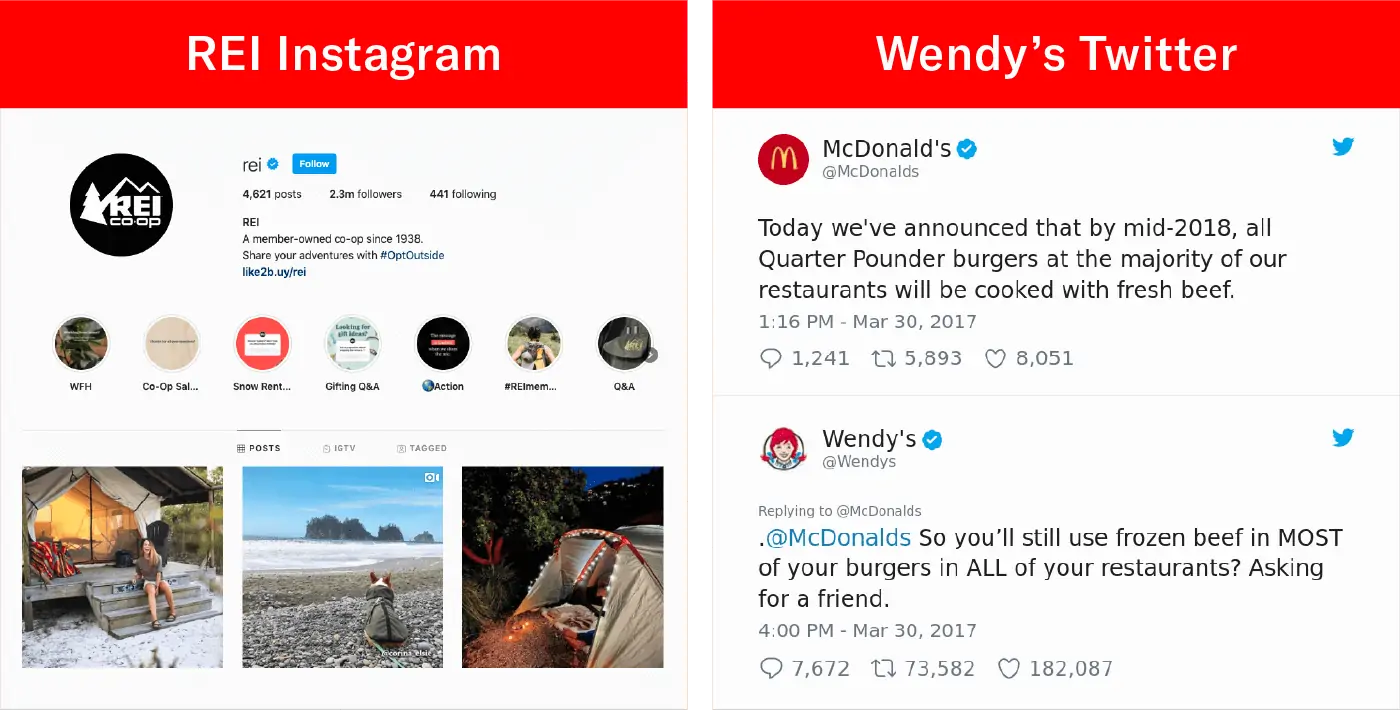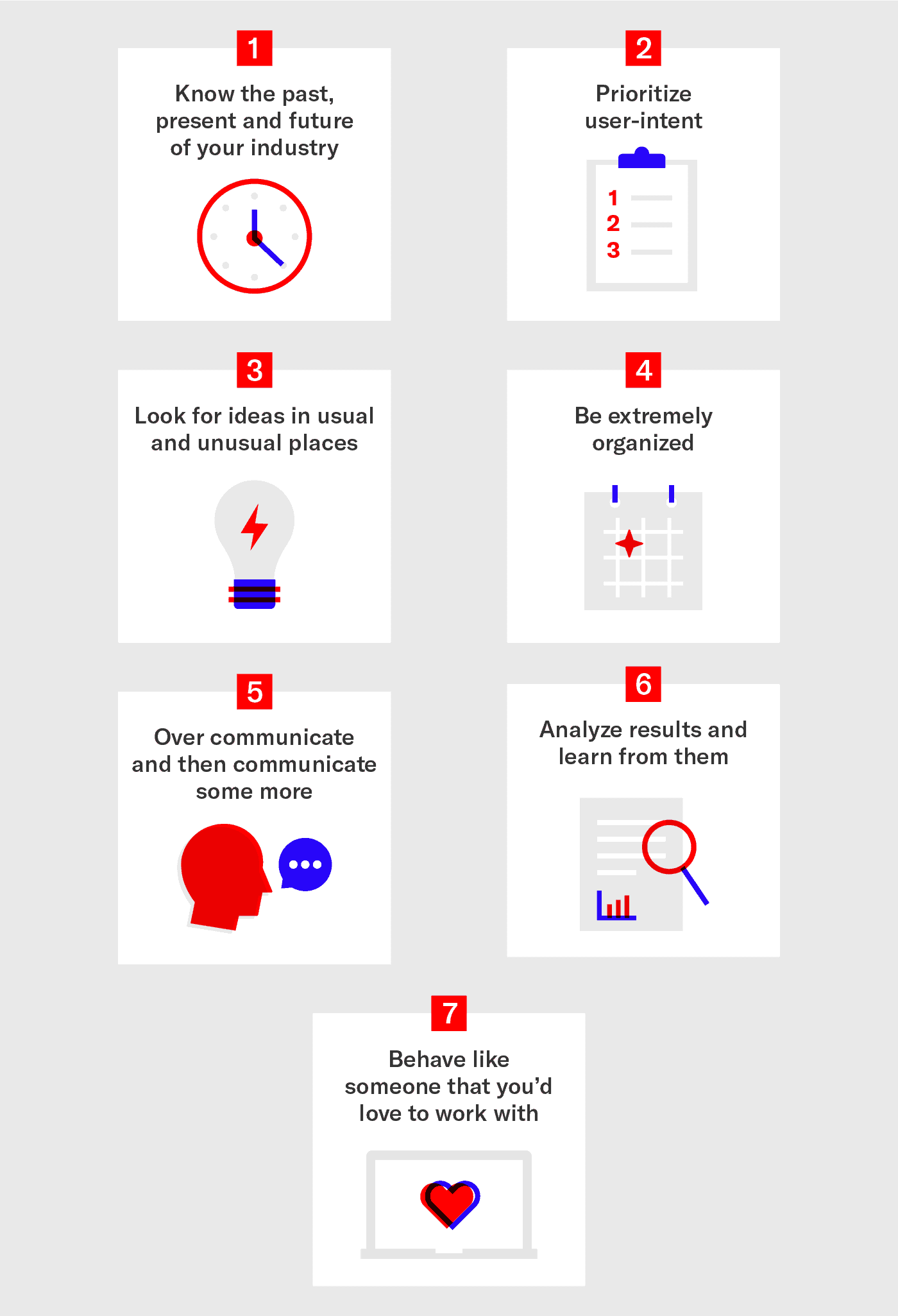Anyone on the internet has seen their fair share of content flops—from the innocently incorrect to cringe-worthy to downright offensive. So what sets great content apart from the mediocre? The content creation team, that’s what.
Even though the digital world is constantly evolving, there is a method to the content creation madness. A great amount of planning and talent goes into a successful piece of content.
Below we’ll cover tips on how to make content creation your career, hand-picked from our 115-person team of content creators.
- What content creators do
- Who needs a content creator
- Where content creators can find work
- How to become a content creator
- The habits of a great content creator
What is a Content Creator?
A content creator is responsible for the ideation and creation of content that connects a brand or entity to its prospective audience.
Content creation encapsulates copywriting, design, production and other media that provide value and connect you to your target audience. Matching search intent and providing value (to the consumer and brand) is the foundation of successful content creation.
What Does A Content Creator Do?
Content creators produce work on a variety of platforms including social media, blogs, podcasts, video platforms, case studies, white papers, infographics and more. This, of course, just scratches the surface of what content creators do. Depending on where you work and where your audience is, your responsibilities will vary widely. Some of these tasks could include:
- Brand Analysis: Evaluating a brand from top to bottom including their tone and voice, design style, strengths, weaknesses, competitors’ strategies and potential content strategies with the most value based on calculating content’s ROI.
- Content Ideation: You may be asked to flex your creative muscles through brainstorming relevant, engaging, and unique content ideas that will deliver results.
- Project Management: Many digital content producers are also tasked with managing the projects they’re helping create—a skillset that will serve you in many different scenarios.
- Copywriting and Research: Copywriting encompasses a wide range of content types from engaging social media captions, to long-form blog posts, to synthesizing year-long studies into a digestible case study.
- Design and Visuals: Great design or photography is crucial to elevate content and gel with the brand persona. Design can make a huge difference in the shareability of an asset, because a picture is worth a thousand words, right?
- Videography: Platforms like YouTube and TikTok have opened new paths to connect with your audience, rank and tie content directly to products through video demonstrations and reviews.
- Editing: This is a crucial skill that applies to copywriting, videography and design. The ability to cut down your work, catch flaws or typos and produce polished deliverables keeps clients happy and work coming your way.
- SEO: Web content writers should be well versed in the basics of SEO and apply them to their pieces for the best visibility. SEO isn’t only a part of the copy game, video SEO and imagery optimizations help content rank.
- Promotion: Once the content is created you’ll want to make sure that it reaches as many relevant targets as possible. This final, but very important step in the content process could include manual link building, crafting an email for subscribers, PR pitches or social engagement.
Who Needs a Content Creator?
Content creators produce content for corporations, organizations, small businesses and individuals alike—anyone who wishes to have an online presence needs a content strategy and creation plan.
The importance of an online presence has become the driving force behind many marketing strategies. Great content can really connect a company to its consumers and build relationships in ways that weren’t possible during the era of “Mad Men” style marketing. People can engage with brands on social media and their blogs and feel involved in the stories they create.
Businesses aren’t the only entities to utilize strategic content. Individuals use content to bolster their personal brand presence and drive ad and sponsorship revenue through engagement rates, traffic and other metrics like follower count. Anyone who wishes to increase traffic, generate quality leads, rank for relevant keywords or improve their brand’s persona could benefit greatly from a content creator.
Where Can Content Creators Find Jobs and Opportunities?
The most common places where content creators can find work is in agencies, in-house teams or to become a freelancer. Within these categories, you’ll find opportunities for design, photography, videography and content writing jobs. The pros and cons of each vary greatly by where you work but they should give you a general idea.
Freelance Content Creator
Freelance content creation work is great for those who value their freedom over a steady flow of work and income. Successful freelancers can generate more than enough business for themselves, so don’t be discouraged if this is your desired path. Freelancers can do work for others or find ways to promote their own media channels and monetize them for a living (like social media influencers).
- Pros: Schedule flexibility, content variety, set your own prices
- Cons: No guaranteed income, no employee benefits
In-House Content Creation
In-house content teams work for one company or an umbrella organization that offers stable income and benefits. You’ll likely be focusing on one industry only but if you land a role in an industry you love, it could be a great fit.
- Pros: Greater control over content strategy, closer collaboration with other marketing teams
- Cons: Less content variety, less potential for creativity
Content Creation Agency
Agency work provides the opportunity to work on a wide range of clients and improve your skill set with the stability and benefits of a salary job. Content agencies can be too fast-paced for some but others thrive in a more dynamic environment.
- Pros: Solid income stream, wide variety of content and clients
- Cons: Fast-paced, can be more competitive
How to Become a Content Creator
There are many paths to become a digital content creator. While most agencies and in-house positions require relevant marketing, writing or design degrees, and years of experience, there are entry-level positions that help you get your foot in the door.
Freelancers need less experience or degrees to get started but should build up their portfolio and resume as well as educate themselves on techniques and trends in order to garner greater work at higher rates. Finding your niche or specialization is the best way to advance your career and build up a rapport in your desired industry.
While everyone’s journey is different, below are some of the most common ways to become a content creator. Check out our SiegeLearn online content marketing course for tailored lessons to help you get started or to build upon your skill set.
1. Educate Yourself
Degree or Certificate
Many universities have expanded their programs into digital marketing and content creation emphases. Since content creation is a multi-faceted job, it’s helpful to have an idea of the type of content creation you’d like to do before committing to a program.
Some paths are more clear, like design and production but content writing and management can be less clear. Some popular degrees mentioned in content writing position descriptions include:
- Marketing
- Public Relations
- Business
- Journalism
- English
If you’re interested in technical writing, clients are looking for experience in that field plus the writing skills to convey what you know—for example, this could look like a degree or work experience in biology plus a technical writing certificate or a portfolio of existing published work.
Internships
Paid and unpaid internships are a great way to break into the content production business. Internships can sometimes lead to full-time positions and at the very least, help you build experience and references for your resume.
Self-Taught
The internet hosts a vast library of resources and courses that you can use to educate yourself and level up your skills. Try the free Google Analytics Certification course and the Udemy: Become a Better Blogger course to help you get started.
2. Find Your Expertise and Niche
Finding your expertise is especially important for freelancers as you’ll want to set yourself apart. Are you interested in writing about a certain industry, technical SEO, content marketing, editing or something else?
For those looking to go the in-house or agency route, you can use your work experience to help find your expertise, especially if it’s early on in your career. To advance your career and gain new opportunities you should demonstrate your unique value through your expertise or niche skills.
3. Soak Up Experiences and New Challenges
This tip is intimately tied to finding your niche. While working, interning or networking, stay aware of what’s happening around you. Take on opportunities that arise, you may find a whole new facet of content creation that you love or pick up valuable skills that you can leverage elsewhere. Some additional skills that are useful to content creators outside of the skills of writing and arts include:
- Technical SEO
- HTML and other developer basics
- Tracking conversions and goals
- Improving your communication skills
4. Create and Maintain Your Own Brand
Personal branding isn’t only for influencers. Maintaining a blog, vlog, podcast or social media account to showcase your personal expertise can help build your authority and foster new business opportunities. The same practices that you would recommend to a client also apply to you:
- Research and see what’s already out there
- Cultivate your own voice and style
- Focus in on your expertise
- Create content with a specific audience member in mind
- Post at a consistent rate
- Engage with the community
At the very minimum, you should have an up-to-date LinkedIn profile but a Twitter account is also recommended.
5. Network Authentically
Organic connections may come as a result of building your personal brand but it’s also important to seek out networking opportunities. Online and in-person networking events and industry conferences are another great way to engage. There are also plenty of online groups on Facebook and Twitter that you can join to connect with like minded individuals.
When engaging with your peers, make sure it’s authentic. Inauthentic compliments are easy to spot and are not well-received. If you have a true compliment, give props where they’re deserved. Instead of a forced compliment try asking questions, pulling out key takeaways or comparing different techniques.
6. Continue Learning
In an ever-changing field like content creation and digital marketing you must continue to grow and stay up-to-date with the latest trends. Subscribe to and follow industry leaders and industry news publications. Set aside time for yourself to learn new skills or read up on new techniques.
Not only will you impress your peers and clients with your drive and depth of knowledge, but you will also make yourself a more valuable asset.
7 Skills and Habits of Successful Content Creators
Having a natural inclination for what makes engaging content and being creative are both important parts of becoming a great content creator—but what really makes someone excel in this field is practicing good habits and putting in the hours to improve. You don’t need to start out as the most amazing writer (though it is an advantage), you can and will improve your skills if you put in the effort. Below is a list of different best practices and tips that make successful content creators.
1. Know Your Industry Inside Out
Set yourself up for success by learning the ins and outs of a particular topic or field. Make it a priority to learn the past, present and future of your industry. This is especially important if you start creating content for a field you aren’t as familiar with. But you should also research fields that you already feel familiar with. Read up on the basics and the past trends as well as the present state of the industry. Content should be forward-thinking, find emerging keyword trends using tools like Google Trends and industry news to stay ahead of the curve and keep content relevant.
2. Prioritize User-Intent
Google algorithm updates point to the importance of creating a great user experience. While a better user experience includes details like alt-text for accessibility and mobile optimizations, it also encompasses the structure and digestibility of your asset.
When outlining or brainstorming ideas for an asset the end user should always be the priority. Think about what information they’re looking for and how to best satisfy the intent behind their search through content order, design and formatting. You shouldn’t need to pick between SEO and user experience, they go hand-in-hand.
3. Look For Ideas in Usual and Unusual Places
Brainstorming can be the most fun, and at times, the most challenging part of the content creation process. A common brainstorming practice is to find inspiration in related content and competitor strategies. Going with tried and true methods is a safe and effective way to drive results, but don’t just rest on your laurels—the best content creators are always striving to be better.
A content creator that thinks outside the box is always looking for inventive ways to convey information. Whether you’re creating content in a ‘boring’ industry or one that’s traditionally more exciting, you can find inspiration in unexpected places. Spinning the format of an asset from a completely different field is a great way to stand out and create engaging content.
4. Be Extremely Organized
Great organization will consistently impress clients and peers and improve their confidence in your project management and your ability to hit deadlines. Try out different tactics and see what works best for you. If you have hopes of successfully managing content production or juggling many freelance jobs at once, organization is key.
5. Over Communicate and Then Communicate Some More
Communication is vital in a successful business partnership. Make it a practice to over communicate, communicate clearly, and support recommendations with data-backed proof. Keep colleagues and clients in the loop about deadlines, performance expectations, projected ROI, and other pertinent information to set reasonable expectations from the beginning. If any of these elements are going to shift, communicate those shifts as soon as possible.
6. Analyze Results and Learn From Them
Before engaging in any projects, there needs to be an agreement about what success would look like for a particular project or client. After a project has gone live, it’s time to start tracking its actual performance against the expected results. Content success is measured by many things including increasing website traffic, its conversion rate, traffic value, the number of links it generates and more.
What good is an amazing analysis if you learn nothing from it? Great content creators pick apart what works, what doesn’t, why it did or didn’t work, and how to make improvements in the future. These takeaways should be communicated with your team and client, it demonstrates care and awareness.
7. Behave Like Someone That You’d Love to Work With
Finally, the cardinal rule: treat others how you would like to be treated. If you’re a talented creator but a drag to work with you shouldn’t expect to make it far in such a collaborative industry. Reputations travel fast and stick with you longer than you think. It’s crucial to put your best foot forward and represent yourself, the client’s brand, and your agency with grace.
Be a driving force of positivity and when you deliver criticism, do so constructively. There is little room for big egos—stay humble because you never know who you might learn from next. Help create a healthy work environment, reassure colleagues when they’re down and root for their successes.
Ready To Create Your Own Path?
Working as a content creator is challenging and rewarding. You get to be a part of a rapidly growing field, create innovative content, and help connect people to helpful materials.
If you’re interested in learning more about Siege Media’s content creation process, check out our SiegeLearn content marketing course or subscribe to our YouTube channel. If you have any questions about what it’s like working at a content marketing agency please feel free to leave a comment below or email us, we’d love to chat!








